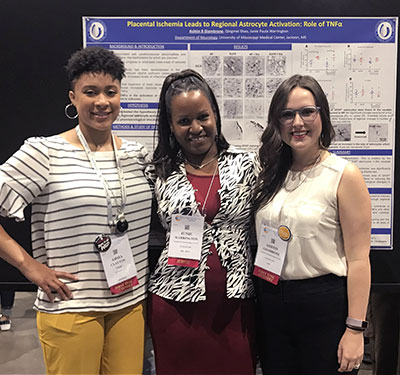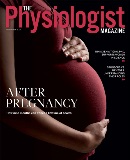Guided by Science
Junie Paula Warrington’s path took her from high school teacher to researching lifesaving therapies for preeclampsia.
By Mike De Socio

Junie Paula Warrington, PhD, was sitting at a welcome dinner at the University of Mississippi Medical Center, and if she was being honest, it was a place she never envisioned being. It was far from her home in the Caribbean, for one thing, and the school had not been on her radar.
She was on the hunt for a postdoctoral fellowship and already had her heart set on the one program she had applied to. But her graduate mentor insisted: You need to at least consider some other options. Warrington obliged and landed the interview in Mississippi, with “absolutely no intention of ever moving there.” She was simply checking a box for her mentor.
But when Warrington arrived at the medical center, she was blown away by what she was hearing. “Honestly, when I came to Mississippi for the interview, I was sold on the evening that I arrived at the dinner,” Warrington says.
The program heads were describing a program for postdocs the likes of which Warrington had not seen at all in her search so far. She was intrigued by the in-depth, specific training plan they had for their students. And the program had data to back it up, showing how successful its trainees had been. She immediately realized she needed a program like this if she wanted to be successful, too.
“I have ambitions and goals. And, you know, coming from outside of the U.S., you come here with a mission, to get your education, to be as successful as possible,” Warrington says.
Warrington is asking questions such as: What is causing neurovascular changes in preeclampsia patients? Which factors increase a mother’s chance of having learning and memory disabilities post-pregnancy? Why do some women have seizures and others don’t?
She accepted the spot in Mississippi and was offered research in preeclampsia—an area that promised to combine the vascular research Warrington was already doing with her interest in neurology. Plus, it would push her studies an extra step, toward physiological approaches and functional experiments. The unexpected move would come to shift the course of her academic career and was one of many serendipitous opportunities that led Warrington to where she is now: an assistant professor at the University of Mississippi Medical Center, studying preeclampsia-complicated pregnancies via translational animal models.
ENCOURAGED TO FOLLOW SCIENCE

When Warrington first came to the U.S. to study psychology, she was a high school teacher laser-focused on a different goal: Returning to her home country—the small Caribbean island nation of Dominica—with the skills she would need to counsel her young students and help them live better lives.
“Being a teacher, I was very concerned. I had a heavy burden to help young people to make better decisions,” says Warrington, who was teaching math and basic science to high school students in Dominica.
She had an early interest in science, but she hadn’t considered pursuing research; it simply wasn’t something she had heard of anyone from Dominica doing. Her parents had not completed elementary school, and she didn’t come from a strong tradition of education, but she decided to become a teacher, a popular choice for many of her peers. However, she eventually felt the pull to the U.S. and a degree in psychology. “I’ve always wanted to come to America. This is the place that you only dream of ever visiting and ever living in,” she says.
From her first freshman-year class, her professors at Fort Valley State University—a historically Black university in Georgia—saw her potential and urged her to change her major to biology. “I didn’t take it seriously because I was still focused on that goal of attaining my psychology degree,” she says.
It wasn’t until the summer, when she worked in a plant science lab on campus—one of the only jobs she was allowed to hold as an international student—that she started to fall in love with research. She shifted her electives and spent the following summer in an animal science lab. When it came time to pursue graduate school, she decided to combine her interests and focus on neuroscience.
Today, Warrington’s work still connects to her early ambitions, in a way: While she’s not counseling kids directly, she has the opportunity to mentor numerous high school, undergraduate, graduate and medical students. Plus, her research has the potential to improve the lives of generations of children.
STUDYING THE LONG-TERM EFFECTS OF PREECLAMPSIA
Preeclampsia is a sometimes-fatal pregnancy complication that affects not only the pregnant person but also the baby. Often, preeclampsia leads to premature births that pose high risks to infants, while putting the mother at serious risk of seizures or even death.
When Warrington entered the field, she knew of only one other researcher focusing on the effects of preeclampsia on the brain. As she and others began to explore the area more, they realized that the symptoms of preeclampsia don’t go away after birth. Indeed, Warrington is finding that the impacts can stretch much farther into the future. Years later, individuals with a history of preeclampsia are at increased risk for developing vascular dementia and are at higher risk of mortality from Alzheimer’s disease and stroke.
Warrington’s current research aims to identify what causes those long-term effects and how they might be prevented. To do that, she is developing animal models that mimic the characteristics found in human patients. So far, Warrington has shown that there are reliable rodent models that exhibit some of the same symptoms. Working with those models, Warrington is asking questions such as: What is causing neurovascular changes in preeclampsia patients? Which factors increase a mother’s chance of having learning and memory disabilities post-pregnancy? Why do some women have seizures and others don’t?
As Warrington’s research paints a fuller picture of the systems at work—and potentially answers some of these questions—these findings can be applied to prevention. “Now we’re trying to see what if we were to prevent this from happening during pregnancy? Can we prevent all these long-term changes?” Warrington says.
One avenue for prevention might lie in the endocannabinoid system, a biological system that is manipulated through cannabis usage and is the subject of one of Warrington’s current projects. She still considers the research to be in its early stages, but it is laying the groundwork for potentially lifesaving therapies. It could also help address disparities, as African American women, in particular, tend to have a higher rate of preeclampsia.
“To me it is a highly impactful area of research because generations of people are affected,” Warrington says.
DEALING WITH SELF-DOUBT
But even now, as an established professor and researcher pioneering a novel field of study, Warrington still has moments of uncertainty. “When you look at social media, you see a lot of posts about imposter syndrome,” she says. “That is real to everybody, and for me it’s even more of a reality because of the fact that I came to biomedical research late in my career.”

When Warrington was working on her PhD, she felt like she had to struggle to catch up to everyone else’s general baseline of knowledge because she had not taken the same courses in undergrad.
“I still have self-doubt; I have knowledge gaps for sure,” Warrington says. And she often feels the pressure of running her own lab and keeping her researchers (and herself) fully funded. “I’m now responsible for their salaries and their livelihood,” she says.
But when she comes home each night to her sons, ages six and seven, she tries to put that all aside. “The clock stops when I get home—that is, the work clock—until they’re in bed,” Warrington says. “I really enjoy just spending time with them.”
Owing to her childhood in the Caribbean, Warrington loves to work outside. She’s cultivating a lush vegetable garden at home, with the help of her sons and husband. This year, they’re growing onions, tomatoes, three types of peppers, potatoes, ginger, herbs, cucumber, asparagus, broccoli, strawberries, ginger, watermelon and “hundreds of collard greens”—the result of last year’s seeds they collected and shook all over the garden.
While Warrington may be thousands of miles away from the natural paradise she grew up in, her life today is, in some ways, not all that different. She is working on finding a way to improve the lives of mothers and children, and she’s created a small patch of natural beauty all her own.
This article was originally published in the September 2022 issue of The Physiologist Magazine.
“I have ambitions and goals. And, you know, coming from outside of the U.S., you come here with a mission, to get your education, to be as successful as possible.”
Junie Paula Warrington, PhD
The Physiologist Magazine
Read the Latest Issue
Don’t miss out on the latest topics in science and research.
Contact Us
For questions, comments or to share your story ideas, email us or call 301.634.7314.


